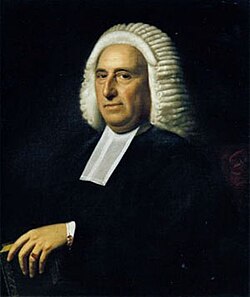This article needs additional citations for verification. (March 2014) |





Mather Byles (born 26 March 1706 – 5 July 1788) was an American clergyman active in British North America.
Byles was descended, on his mother's side, from John Cotton and Richard Mather, and was a grandson of Increase Mather and nephew of Cotton Mather. As a young man, he corresponded with Alexander Pope and Isaac Watts.
He graduated at Harvard University in 1725, received his A.M. degree there in 1728 and in 1733 he became pastor of the Hollis Street Church (Congregational), Boston. In 1765 he received a degree of Doctor of Divinity from the University of Aberdeen.
Byles held a high rank among the clergy of the province and was noted for his scholarly and well-written sermons, as well as his ready wit. He often exchanged poetic satires and parodies with another Boston wit of that time, Joseph Green. At state funerals, he was often a picked to give the sermon.[1]
He published a book of verse, Poems on Various Occasions in 1744. In 1773, he was chosen to be one of the eminent Boston literary intellectuals to examine Phillis Wheatley in order to determine if the black woman was actually the author of a proposed book of poems. (He and the rest of the panel determined that she was.)[2]
At the outbreak of the American Revolution, Byles was outspoken in his advocacy of the royal cause, and after the British evacuation of Boston his connection with his church was dissolved.
Byles remained in Boston, however, and subsequently (1777) was arrested, tried and sentenced to deportation. This sentence was later changed to imprisonment in his own house. (He called the sentry stationed outside the house his "Observe-a-Tory".[3]) He was soon released, but never resumed his pastorate.
He is known for saying "Which is better - to be ruled by one tyrant three thousand miles away or by three thousand tyrants one mile away?" A variation of the quote is spoken by Mel Gibson in The Patriot.
Byles died in Boston on 5 July 1788, aged 82.
Besides many sermons Byles published A Poem on the Death of George I (1727).
- ^ Gates, Henry Louis Jr. (2003). The Trials of Phillis Wheatley: America's First Black Poet and Her Encounters With the Founding Fathers, New York: Basic Civitas Books. ISBN 978-0-465-01850-5, p. 10
- ^ Gates, Henry Louis Jr. (2003). The Trials of Phillis Wheatley: America's First Black Poet and Her Encounters With the Founding Fathers, New York: Basic Civitas Books. ISBN 978-0-465-01850-5, p. 10
- ^ Gates, Henry Louis Jr. (2003). The Trials of Phillis Wheatley: America's First Black Poet and Her Encounters With the Founding Fathers, New York: Basic Civitas Books. ISBN 978-0-465-01850-5, p. 10